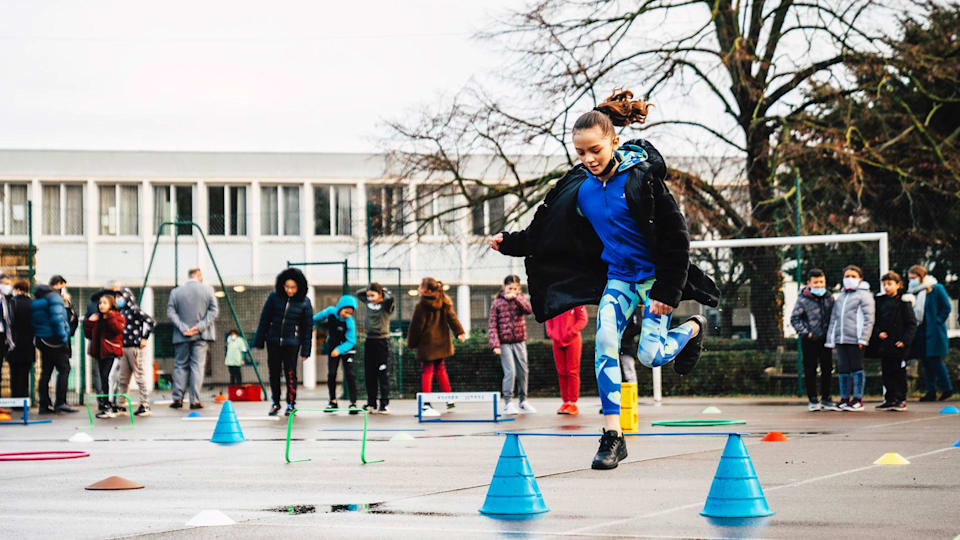Paris 2024 – getting children moving more at school for 30 minutes a day
The Olympic and Paralympic Games make an impact even before they begin; and Paris 2024 is no exception. The Games may still be more than three years away, but they have already begun creating benefits for their hosts. Central to these is the promotion of physical activity and its wide-ranging benefits in French schools and beyond.

Paris 2024’s mission is to get more children exercising, as part of the fight against the sedentary lifestyles of some young people, now compounded by the COVID-19 pandemic.
One of the many ways in which Paris 2024 aims to promote the benefits of physical activity is through the annual Olympic and Paralympic Week (Semaine Olympique et Paralympique, SOP), which took place for the fifth time last week.
Launched in January 2017 by Paris 2024 as part of its Olympic and Paralympic Education Programme, which each Organising Committee is tasked with developing and implementing, the SOP is now part of the programme of the French Ministry of National Education, Youth and Sport. Its aim is to promote the benefits of physical activity and Olympic and Paralympic values such as excellence, respect and determination, as well as values related to sport more generally, such as resilience and fair play.
Being active, 30 minutes a day
At the heart of the 2021 edition of the SOP was an initiative to introduce 30 minutes of daily physical activity into French schools.
The World Health Organization (WHO) recommends that children and teenagers engage in at least 60 minutes of physical activity per day, and has found that as many as 80 per cent of them do not exercise enough. Physical exercise helps to protect against heart disease, type-2 diabetes and cancer, and also helps prevent depression and anxiety. It enhances thinking, learning and overall well-being, according to WHO.
Running from 3 to 8 February, and despite the health restrictions linked to the COVID-19 pandemic, the SOP mobilised more than 3,000 primary and secondary schools and higher education institutions, reached more than 500,000 young people and engaged more than 18,000 classes. A total of 1,500 projects were created as part of the initiative.
The pilot programmes of the initiative were launched by the Ministry of Education, Youth and Sport – with support from Paris 2024 – in November in 800 schools across France, where children now begin every school day with 30 minutes of running, jumping, dancing and throwing. Paris 2024 plans to complement the project by releasing toolkits to support teachers in implementing the 30-minute daily sports activities in their classes.
“We know that an extra 30 minutes’ physical activity a day significantly helps pupils concentrate,” said Tony Estanguet, President of the Paris 2024 Organising Committee. “These are children who are coming to realise the simple reality we had collectively lost sight of: that staying active is just as essential as sleeping and eating! They are budding adults getting a taste for exercise so that it will become almost second nature. Thirty minutes more exercise a day will make for a healthier generation.”
Online and physical events during the SOP last week gave schoolchildren the opportunity to meet with French athletes, such as Rio 2016 Olympic silver medallist and world record holder in the decathlon Kevin Mayer, Rio 2016 silver medallist in judo Clarisse Agbegnenou and Paralympic champion Marie-Amélie Le Fur, to learn about their sports and get inspired by their stories. Videos featuring athletes and influencers were shared on social media and broadcast in schools, followed by 30-minute live sessions which allowed the students and teachers to interact.
#STAYACTIVE
The wide-ranging benefits of sport and physical activity have been particularly underlined during the COVID-19 pandemic. In November 2020, WHO released a series of guidelines which estimated that the world could avoid as many as five million deaths each year if the global population was more physically active.
The guidelines recommend 150 to 300 minutes of moderate aerobic activity each week for adults, and an average of 60 minutes’ exercise each day for children and adolescents.
“These new guidelines underline how sport and physical activity can contribute directly to physical and mental health and combatting non-communicable diseases,” said IOC Medical and Scientific Director Dr Richard Budgett, as the IOC welcomed the WHO guidelines. “The recommendations come at an incredibly significant time, with the world still coming to terms with the impact of the COVID-19 pandemic. We have seen during this time of lockdowns and physical distancing just how important it is to stay physically active.”
The IOC President, Thomas Bach, has repeatedly called for governments to include sport in their post-coronavirus recovery plans, noting that sport can also help to create jobs and generate business opportunities. In July 2020, 118 Member States of the United Nations (UN) called for all States to include sport and physical activity in their COVID-19 recovery plans.
With that spirit in mind, while many governments were introducing lockdowns to contain the coronavirus outbreak in March 2020, the IOC launched a digital campaign using the hashtags #StayStrong, #StayActive, #StayHealthy to promote the importance of physical activity. The campaign showcased athletes who shared with their fans the exercises that they had invented for lockdown conditions.
